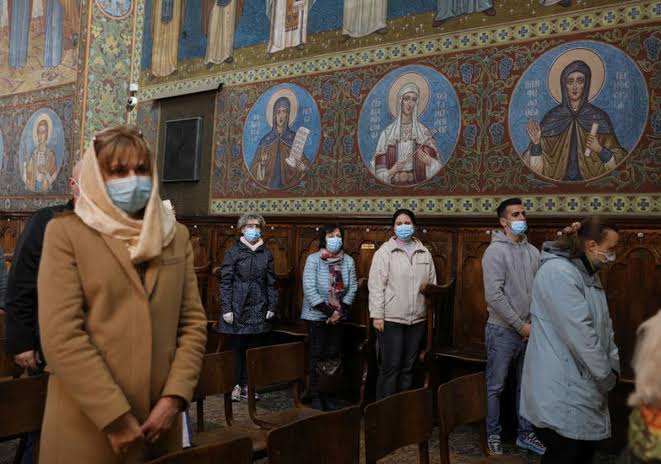Clad in protective masks and gloves, a few dozen pious Orthodox Christians prayed for health on Sunday at the Bulgarian capital Sofia’s expansive Saint Nedelya Cathedral.
SEE ALSO: Sudan needs $120m to Fight Coronavirus, says Minister
The country was one of the few nations where churches were open over the Easter holidays.
While most Bulgarians stayed home out of fear of the coronavirus pandemic, Spaska Gentcheva, a 48-year-old lawyer, said she was thankful to be allowed to attend the Palm Sunday service.
“We took a decision in my family,” Gentcheva said.
“One family member would visit the church today and the rest are staying at home, keeping in mind the (coronavirus) measures.”
In an effort to contain the spread of highly contagious new disease, Sofia has closed schools, restaurants, bars and banned access to parks and inter-city travel. Bulgaria
has reported 669 cases of the virus and 28 deaths.
But it has allowed public access to churches, unlike neighbouring Greece and Romania, also predominantly Orthodox Christian.
The same rules will apply next Sunday, when the Orthodox world celebrates Easter.
The Bulgarian Orthodox Church has agreed not to hand out blessed branches, a popular Palm Sunday custom, and has pledged to disinfect places of worship regularly, while the government urged people to celebrate from home.
The willow branches are typically placed on the church altar, where a priest blesses them, and later woven into a wreath hung at home as a symbol of health and protection from evil.
The decision to keep churches open has sparked an intense debate on social media in Bulgaria, where many attend Easter services but are not regular churchgoers.
Many fear churches will become centres of contagion and pose risks to the most vulnerable – the elderly – jeopardising the collective effort to contain the disease.
Churches in the largest Orthodox country, Russia, were open on Sunday but the Russian Orthodox Church ordered temples in Moscow and the surrounding region to close their doors for “big numbers of people” during the Holy Week on April 13-19.
For Martin Zhekov, a Sofia fashion hairdresser, attending church on Palm Sunday was a need he could not brush aside.
“The church always gives solace, especially in these troubling times,” he said. “Nothing is like it used to be and nor will it be any time soon.”
Elsewhere, on what was Easter Sunday for other Christian denominations, Pope Francis delivered his Easter message to Roman Catholics from a empty St. Peter’s Basilica in Rome.
Also just a handful of clerics gathered at Jerusalem’s Church of the Holy Sepulchre, the traditional site of Jesus’ death and resurrection that is normally packed with pilgrims.




 Premier League
Premier League